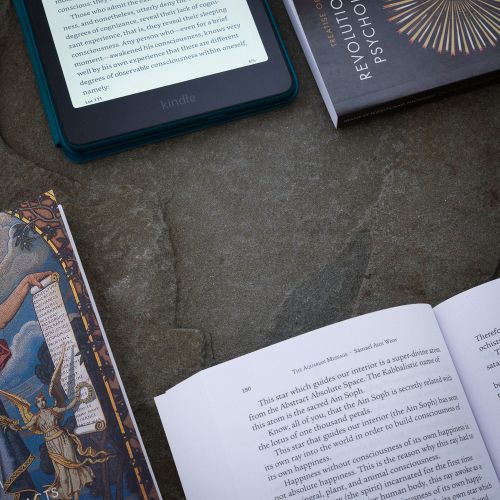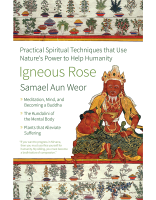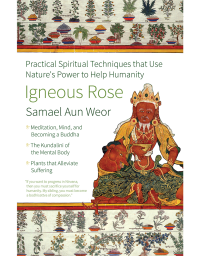1. Meditation is the esoteric discipline of the Gnostics.
2. Meditation has three steps: concentration, meditation, and samadhi.
3. Concentration means to fix the mind on only one object. Meditation means to reflect upon the substantial contents of that one object. Samadhi is ecstasy, mystical joy.
4. A master of samadhi penetrates all the planes of consciousness, and with the Eye of Dangma he investigates all the secrets of the wisdom of the fire.
5. It is urgent for our Gnostic disciples to learn how to function without any type of material vehicles so that they can perceive all the marvels of the universe with the Eye of Dangma.
6. This is how our disciples will convert themselves into masters of samadhi.
7. The disciple must profoundly meditate on his physical body while lying down on his bed with his hands crossed over his chest. He will tell himself: “I am not this physical body.”
8. The disciple must then profoundly meditate on his ethereal body, telling himself: “I am not this ethereal body.”
9. Then, submerged in profound internal meditation, the disciple must reflect on his astral body, and must say: “I am not the astral body.”
10. The disciple must now meditate on his mental body and must say to himself: “Neither am I this mind with which I am thinking.”
11. The disciple must then reflect on his willpower, and must tell himself: “Neither am I this body of willpower.”
12. The disciple must now meditate in his consciousness, and must say to himself: “Neither am I the consciousness.”
13. Now, at last, submerged in profound meditation, the disciple must exclaim in his heart: “I am the Innermost, I am the Innermost, I am the Innermost.”
14. Once out of all his vehicles, the disciple will then be an indivisible majesty of the infinite.
15. He will then see that he does not need to think because the wisdom of the Innermost is: Yes, Yes, Yes.
16. The disciple will now be aware that the action of the Innermost is: Yes, Yes, Yes.
17. The disciple will now understand that the nature of the Innermost is absolute happiness, absolute existence, and absolute omniscience.
18. In these instances of supreme happiness, past and future join within an eternal now. The great cosmic days and the great cosmic nights are taking place, one after the other, within an eternal instant.
19. In this plenitude of happiness our disciples can study all the wisdom of the fire within the blazing flames of the universe.
20. This is how our disciples learn to function without any material vehicles, in order to study all the secrets of the elemental magic of nature.
21. There is the necessity for the Innermost to learn how to undress Himself in order to function without vehicles in the great alaya of the world.
22. Concentration, meditation, and samadhi are the three obligatory paths for initiation.
23. First of all, attention is fixed on the body with which we want to practice. Then, we meditate on its internal constitution, and filled with mystical joy we say: “I am not this body.”
24. Concentration, meditation, and samadhi must be practiced on each body.
25. Concentration, meditation, and samadhi are known in the East as samyama. We must perform it on each one of our vehicles.
26. In order to divest each one of our inferior vehicles, we must practice a samyama on each one of our vehicles.
27. The great ascetics of meditation are the great sannyasis of the cosmic mind, whose flames glow within the igneous rose of the universe.
28. It is urgent to acquire absolute chastity, tenacity, serenity and patience in order to be a sannyasin of the mind.
29. After a certain time of practice, our disciples can liberate themselves from all of their six vehicles in order to function in the great alaya of the universe without any kind of vehicles.
30. The disciple will notice that his dreams become clearer day by day. He will then comprehend that when his physical body sleeps, the internal man travels, acts, and works within the supra-sensible worlds.
31. The disciple will now understand that so-called dreams are living experiences in the internal worlds.
32. Our head is a tower with two rooms, the cerebrum and the cerebellum.
33. The cerebellum is the room of the subconsciousness. The cerebrum is the room of the consciousness.
34. The wisdom of the internal worlds belongs to the room of the subconsciousness. The things of our world belong to the room of the consciousness.
35. When the consciousness and the subconsciousness are united, one can then study all the marvels of the internal worlds and pass them to the physical brain.
36. It is urgent that our disciples join the two rooms of this marvelous tower of our head.
37. The key for this is the retrospective exercise.
38. When we awake after our dream, we must practice a retrospective exercise. This is in order to remember all the things that we saw and heard and all the works that we performed when we were out, far from the physical body.
39. This is how the two rooms of the consciousness and the subconsciousness are joined in order to give us great illumination.
40. There are no false dreams. Every dream is a living experience in the internal worlds.
41. Even the so-called nightmares are real experiences, because the monsters of nightmares truly exist in the submerged worlds.
42. Indigestion can put certain chakras of the lower abdomen into activity. We then penetrate into the atomic infernos of the human being where, truly, the most monstrous beings of the universe live. This is what is called nightmares.
43. The images of the supra-sensible worlds are totally symbolic. There is a need to learn how to interpret them, basing ourselves in the law of philosophical analogies, in the law of analogies of the opposites, in the law of correspondences, and the law of numerology.
44. Even the most apparently absurd dreams enclose the greatest revelation, if they are wisely interpreted.
45. Our disciples must not move themselves at the time of awakening, because with this movement, the astral body is agitated and the memories are lost.
46. As soon as he awakes on his bed, the disciple first needs to practice the retrospective exercise in order to remember with precision all of his internal experiences. This is how internal wisdom is attained, when the two rooms of the consciousness and the subconsciousness are united.
47. The samnyasin of thought achieves continuous consciousness within the igneous rose of the universe.
48. It is necessary to achieve the most profound serenity. It is urgent to develop patience and tenacity.
49. There is the need to remain indifferent before praise and slander, before triumph and failure.
50. It is necessary to change the process of reasoning for the beauty of comprehension.
51. It is indispensable to make an addition of all our defects and dedicate two months to each defect, until eliminating all defects.
52. Whosoever intends to eliminate all defects at the same time is similar to the hunter that wants to hunt ten hares at the same time. He does not succeed in hunting any of them.
53. In order to become a master of samadhi, it is urgent to cultivate a rich interior life.
54. The Gnostic who does not know how to smile has less control of himself, like the one who only knows the guffaw of Aristophanes.
55. There is the need to achieve complete control of ourselves. An initiate can feel happiness, but he will never fall into the frenzy of madness. An initiate can feel sadness, but he will never reach desperation.
56. He who is desperate about the death of a beloved being still does not serve as an initiate, because death is the crown of everyone.
57. During the practice of meditation, the chakras of our disciples’ astral body enter into activity. Disciples then begin to perceive the images of the supra-sensible worlds.
58. In the beginning, the disciple perceives fleeting images. Later, the disciple totally perceives all the images of the supra-sensible worlds.
59. This first stage of knowledge belongs to ‘imaginative’ knowledge.
60. The disciple contemplates many images that are mysteries for him because he does not understand them.
61. Yet, as long as he perseveres with his practices of internal meditation, he will then feel that the supra-sensible images produce certain feelings of happiness or pain.
62. The disciple then feels inspired in the presence of the internal images. He has thus risen to the stage of inspired knowledge.
63. Later, when he sees an internal image, instantaneously he knows its significance and the reason for many things. This is the third stage of knowledge, known as intuitive knowledge.
64. Imagination, Inspiration, and Intuition are the three obligatory paths for initiation.
65. We reach these three ineffable heights by means of concentration, meditation and samadhi.
66. Whosoever has reached these ineffable heights of intuition has converted himself into a master of samadhi.
67. Asian wisdom practices meditation in the following order:
1. Asana (posture of the body).
2. Pratyahara (thinking in nothing).
3. Dharana (concentration on only one thing).
4. Dhyana (profound meditation).
5. Samadhi (ecstasy).
68. It is necessary to place the body in the most comfortable position (asana).
It is indispensable to empty the mind before concentrating (pratyahara).
It is urgent to know how to fix the mind on only one object (dharana).
Then, we profoundly reflect on the content of the object itself (dhyana).
Thus, in this way, we reach ecstasy (samadhi).
69. All of these esoteric disciplines of the mind must completely saturate our daily life.
70. In the presence of any person, many images that correspond to the internal life of that person with whom we are in contact will emerge from our interior. This is known as clairvoyance.
71. Later, these images produce distinct feelings of inspiration within ourselves. The disciple has then reached the stage of inspired knowledge.
72. Finally, in the presence of any person, the disciple instantaneously knows the life of that person. This is the stage of intuitive knowledge.
73. Those who want to enter into the wisdom of the fire must overcome the process of reasoning and cultivate the ardent faculties of the mind.
74. We must only extract the golden fruit from reasoning.
75. The golden fruit of reasoning is comprehension.
76. Comprehension and imagination must replace reasoning.
77. Imagination and comprehension are the foundation of the superior faculties of the mind.
78. In order to enter into the knowledge of the superior worlds, it is necessary to acquire the superior faculties of the mind.
79. Those who read the teachings of The Igneous Rose and yet stubbornly continue to be enclosed in the process of reasoning do not serve for the superior studies of the spirit. Such individuals are not yet mature.
80. Clairvoyance and imagination are the same. Clairvoyance is imagination and imagination is clairvoyance. Clairvoyance exists eternally.
81. When an image emerges in our interior, it is then necessary to serenely examine it in order to know its contents.
82. When the igneous rose of our astral body (situated in the middlebrow) awakens into new activity, then the images that come internally to our imagination are accompanied with light and color.
83. It is necessary to learn by direct experience how to differentiate between the images that are received and the images that we consciously or unconsciously create or project.
84. It is necessary to differentiate between our own images and the outer images that come to us.
85. The imagination has two poles, one being a receptor and the other a projector.
86. Receiving an image is one thing. Projecting an image created by our mind is another thing.
87. The contrary pole of the imagination is [all that is] imaginary [fantasy].
88. Imagination is clairvoyance.
89. Fantasy is all the absurd images that are created by a mind filled with aberrations.
90. Instructors must not only give practices to disciples in order to awake the frontal chakra, but they must also teach them how to control the clairvoyance.
91. Clairvoyance is imagination. This chakra resides in the middlebrow.
92. Imagination is translucent. For wise individuals, to imagine is to see.
93. The Age of Reason was initiated by Aristotle. It reached its culmination with Emmanuel Kant and ends now with the birth of the new era of Aquarius.
94. The new era of Aquarius will be the era of the intuitive humanity.
95. We must learn to differentiate between creating an image with the mind and capturing an image that floats in the supra-sensible worlds.
96. Many people may say, “How is it possible for me to capture an image when I am not clairvoyant?”
97. We must answer them that imagination is the same as clairvoyance and that every human being is more or less imaginative, which means, more or less clairvoyant.
98. The most damage that has been caused to the students of esotericism is a result of the false concept that exists about clairvoyance.
99. The creators of this false concept are the ‘intellectuals’ who have observed the faculties of the imagination with scorn.
100. Wanting to defend themselves from this intellectual disdain, the esotericists began to give a scientific tinge to the imagination and the name of clairvoyance or sixth sense was given to it.
101. This attitude of the esotericists damaged themselves because they remained in confusion.
102. Now, the esotericists (who are victims of the intellectuals) have established a terrible abyss between clairvoyance and imagination.
103. Many people ask themselves, “How can I perceive images without being a clairvoyant?”
104. Poor people! They do not know the treasure which they possess. They ignore that imagination is the same as clairvoyance and that every human being is more or less clairvoyant.
105. The esotericists have wanted to convert the beautiful faculty of clairvoyance into something artificial, technical and difficult.
106. Clairvoyance is imagination. Clairvoyance is the most beautiful, the most simple and pure flower of spirituality.
107. When we re-conquer our lost infancy, all the images that come to our imagination are accompanied by vivid astral colors.
108. The intellectual who despises imagination commits a grave absurdity because everything that exists in nature is a child of imagination.
109. The artist who paints a picture is a great clairvoyant.
110. One remains amazed before Leonardo da Vinci’s Christ or before Michelangelo’s Madonna.
111. The artist perceives sublime images with his imagination (clairvoyance). He then places them with paint over the canvas or he carves them for his sculpture.
112. Mozart’s Magic Flute reminds us of an Egyptian initiation...
113. When the mother goddess of the world wants to give a toy to humans for their entertainment, she then places it in the imagination of inventors. This is how we have the radio, the airplane, the automobile, etc.
114. When the tenebrous images of the submerged worlds are captured by the scientists, these are then converted into cannons, machine guns, bombs, etc.
115. Therefore, the entire world is more or less clairvoyant. Imagination cannot be despised because all things are children of imagination.
116. It is necessary to differentiate between the people who have not received any esoteric education and those who have already submitted themselves to great esoteric disciplines.
117. Imagination evolves, develops, and progresses within the igneous rose of the universe.
118. Those who have already caused the magic wheel of their middlebrow to rotate, possess a rich and powerful imagination and all the images which are perceived by them are accompanied with light, color, heat and sound.
119. We do not deny the existence of clairvoyance. Clairvoyance is the sixth sense. Its chakra resides in the middlebrow and has ninety-six rays. What we want is to increase this concept and to make the student to comprehend that the other name for clairvoyance is imagination. People have forgotten how to use and control divine clairvoyance. It is necessary for our students to know that imagination is actually clairvoyance or the sixth sense situated in the middlebrow.
120. Many people believe that imagination is purely a mental faculty and that it has nothing to do with the clairvoyant frontal chakra.
121. This false concept is due to the disdain that intellectuals feel about imagination, and to the cunning way through which the esotericists want to make a technicality of this beautiful faculty of clairvoyance.
122. The frontal chakra of the astral body is intimately related with the frontal chakra of the mental body, with the frontal chakra of the ethereal body and with the pituitary gland, situated in the middlebrow of the physical body.
123. Therefore, imagination belongs to all the planes of the universal consciousness. Clairvoyance is precisely the same imagination with the susceptibility of development, evolution and progress within the igneous rose of the universe.
124. It is necessary for the devotees of the path to have a well-equilibrated mind.
125. When we speak of logic, we allude to a transcendental logic that has nothing to do with the text of scholastic logic.
126. Every internal image has a scientific correspondence in this plane of physical objectivity.
127. When the images of the student cannot be explained with a logical concept, it is a sign that the mind of the student is completely disequilibrated.
128. Every internal image must logically have a satisfactory explanation.
129. There are innumerable amounts of students who have completely unbalanced minds.
130. The Gnostic disciples must cultivate serenity.
131. Serenity is the most powerful key for the development of clairvoyance.
132. Anger destroys the harmony of wholeness and totally damages the petals of the igneous rose of the middlebrow.
133. Anger disarranges the astral light into a poison known as Imperil which damages the petals of the igneous rose of the middlebrow and obstructs the channels of the grand sympathetic nervous system. It is necessary to rotate the chakra of the clairvoyance with the vowel “I.” This vowel must be vocalized daily prolonging the sound of the vowel in the following manner: iiiiiiiiiiiiiiii (pronounce the “I” as “ee”).
134. We must contemplate internal images within the august serenity of the flames of blazing thought, without the depressing process of reasoning.
135. In the presence of an internal image, our mind must flow integrally with the sweet flow of thought.
136. Our mind vibrates with waves of discernment among the imaginative pictures.
137. Discernment is direct perception of the truth without the process of conceptual selection.
138. When the process of selection divides the mind into the battle of the antitheses, then the internal images are hidden like stars behind the stormy clouds of reasoning.
139. We must learn to think with the heart and to feel with the head.
140. Our mind must become exquisitely sensitive and delicate...
141. The mind must liberate itself from all types of bonds in order to comprehend life, free in its movement.
142. We admire boldness.
143. Desires of all types are bonds for the mind.
144. Prejudice and preconception are bonds for the mind.
145. Schools are cages where the mind remains a prisoner.
146. We must always learn to live in the present, because life is always an eternal instant.
147. Our mind must convert itself into a flexible and delicate instrument for the Innermost.
148. Our mind must convert itself into a child.
149. During the practices of internal meditation, we must be in the most absolute interior repose, because every agitation of the mind and every attitude or impatience disturbs the mind and impedes the perception of internal images.
150. In the physical world, every activity is accompanied by the movement of our hands, legs, etc. However, in the internal worlds, we need the most profound internal repose and absolute calmness in order to receive the internal images that come to the mind like a grace… like a blessing.
151. It is indispensable that our disciples cultivate the beautiful quality of veneration.
152. We must profoundly venerate all sacred and divine things.
153. We must profoundly venerate all the works of the Creator.
154. We must profoundly venerate the venerable masters of the Universal White Fraternity.
155. Respect and veneration completely open the doors of the superior worlds for us.
156. We must not have preferences for anyone. We must attend the beggar and the gentleman with the same respect and veneration.
157. We must cultivate the same courtesy for the rich and the poor and for the aristocrat and the peasant in order to equally attend to them without any preferences.
158. We must cultivate patience and prudence.
159. The ants and the bees are patient and prudent.
160. We must end all eagerness for accumulation and for greed.
161. We must learn to be indifferent before gold and wealth.
162. We must learn to appreciate the Doctrine of the Heart more.
163. He who despises the Doctrine of the Heart because he follows the Doctrine of the Eye (theories, schools, bookish culture, etc.) can never reach great realizations.
164. We must learn how to know good from evil and evil from good.
165. In everything that is evil, there is something good; in everything that is good, there is something evil.
166. Although it seems incredible, the Mary Magdalenes are much closer to initiation than many innocent girls.
167. Although it seems unusual to the student, the one who is pointed at and accused with the finger is often closer to the initiation than the hypocritical, sanctimonious one who sweetly smiles before the people in the auditorium of the lodge or temple.
168. Paul of Tarsus was an executioner and an assassin before the event that took place in his journey to Damascus.
169. The instantaneous transformation of this man surprised all the saints of Jerusalem.
170. The evil one converted himself into a prophet...
171. This is the mystery of Baphomet.
172. Animal pedestals sustain the sacred objects of the temples. The legs of the thrones of the masters are made of monsters.
173. Christ knew how to appreciate the beauty of the teeth on a decomposing body of a dog.
174. Blue flames were blazing in the demon Beelzebub. These flames assisted him in order to transform him into a disciple of the White Hierarchy.
175. Crime is often hidden within the incense of prayer.
176. The disciple must not judge anyone, nor criticize anyone, in order to form a rich interior life.
177. At times, it is a crime to speak, and at other times, it is a crime to be silent.
178. It is a crime to speak when we must be silent, and likewise, it is a crime to be silent when we must speak.
179. There is the need to learn how to control the word and to know how to calculate with exactness the result of our words.
180. One word can serve as a blessing to one person, yet as an insult to another.
181. Therefore, we must calculate very well the result of a word before it is uttered.
182. The lords of karma judge the results of actions without taking into account good intentions.
183. Our mind must be simple and humble and filled with the most profound respect.
184. Our disciples must carefully avoid any argument in order not to waste their energy uselessly.
185. Whosoever wants to accept the doctrine of the Gnostics, let him accept it. Whosoever does not want to accept it is not yet mature. Therefore, it is useless to form an argument in order to convince such an individual.
186. “May argument be forbidden. May discord in words be thrown down. May all weeds leave the path clear.”
187. We must cultivate gratitude because ingratitude and treason are joined.
188. It is necessary to eliminate envy, because the Judas’s who sell the master for thirty silver coins are the outcome of envy.
189. Envy is a poisonous flower that is greatly abundant among the tenebrous swamps of all the spiritual schools of the world.
190. Envy is often disguised with the cloak of the judge.
191. We must cultivate sincerity, because the most beautiful flowers of the spirit sprout within the substance of sincerity.
192. All these qualities will give us a rich interior life. This is how we internally prepare ourselves for the great esoteric disciplines of the mind, that blaze within the burning flames of the universe.







